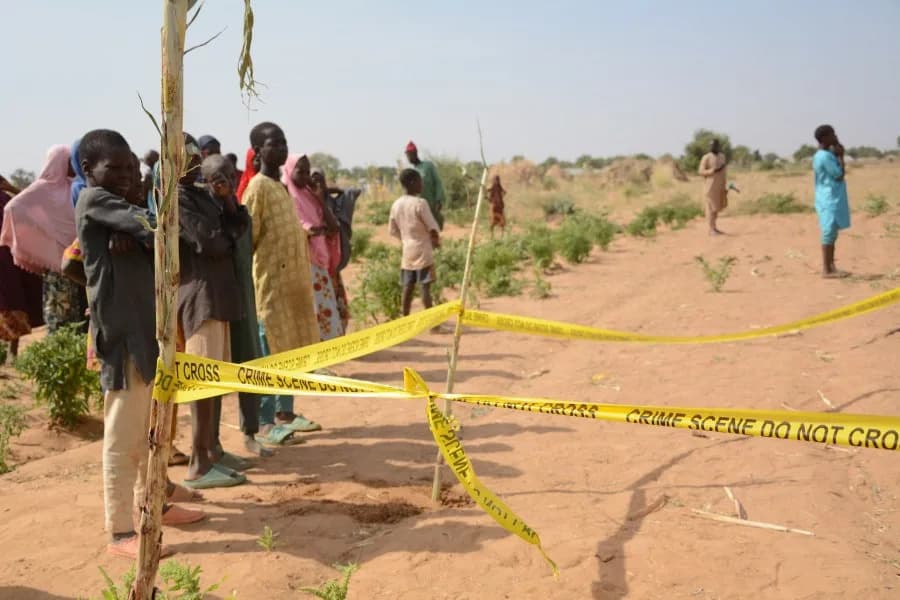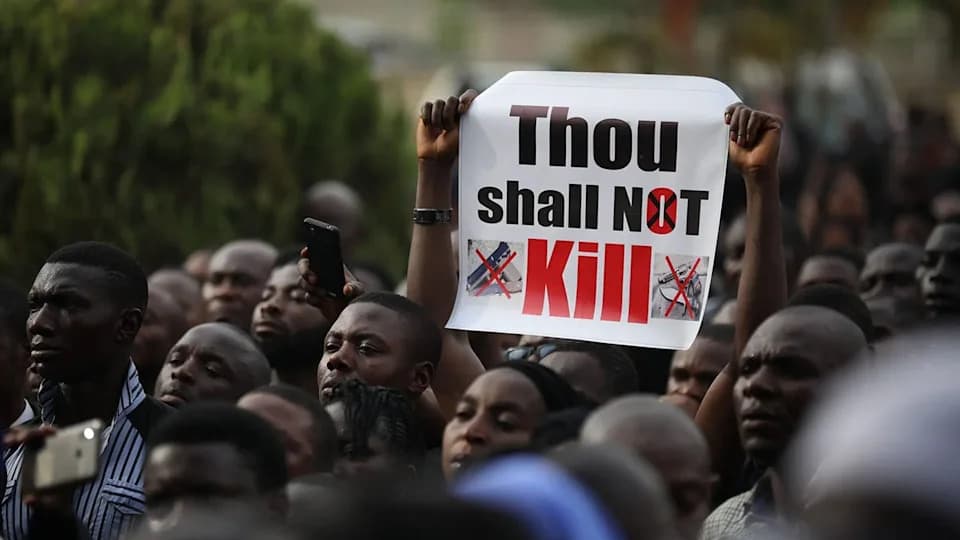At least 100 people were killed when attackers set fire to buildings in Yelewata, Benue state, burning residents who had taken refuge inside. The massacre has prompted US political calls for sanctions and even talk of military options from former president Donald Trump, but Nigerian officials and analysts warn such a narrow response risks misreading a complex crisis. Experts say the middle-belt violence is driven by overlapping factors — desertification, resource competition, herder–farmer clashes, criminal gangs and Islamist groups — and that foreign military action could deepen sectarian tensions and cause harmful collateral damage.
“Burned Alive” in Yelewata: Massacre in Nigeria Fuels US Threats — Experts Warn Military Action Could Backfire

Night attack in Benue leaves scores dead
The killers descended in the darkness, their arrival muffled by rain. In Yelewata, a Christian farming village in central Nigeria’s Benue state, most residents were asleep when gunfire shattered the night.
Some villagers fled into nearby bushland. Others who could not escape hid in the church, the school and the market stalls, holding their breath as assailants moved through the settlement, shooting or hacking down anyone they encountered. The attackers then set buildings alight, burning men, women and children who had sought refuge inside.
At least 100 people were reported killed in the early-June massacre in Yelewata, according to Amnesty International; some sources suggested the toll could be much higher. The atrocity intensified calls from campaigners focused on violence against Christians in Nigeria and drew attention from international politicians and religious figures.
US political response and threats of intervention
In the United States the attack was seized on by some Republican politicians. Senator Ted Cruz introduced legislation to sanction Nigerian officials he said were complicit in violence against Christians and to designate Nigeria as a "country of particular concern" for religious freedom abuses. Former US president Donald Trump ordered the Pentagon to plan for potential military options and warned he might intervene "guns-a-blazing" if Nigeria did not protect its Christian citizens.
One White House adviser, Pete Hegseth, said the US was preparing to act unless the Nigerian government improved protection for civilians, framing the violence as perpetrated by "Islamic terrorists." Nigerian officials and many country experts regard such statements as largely rhetorical and warn that a narrow, faith-focused US response risks misunderstanding the crisis.
Complex, overlapping causes behind the violence
Analysts say the violence in Nigeria’s middle belt — where predominantly Christian southern farming communities meet largely Muslim herding groups from the north — is driven by a web of factors. Environmental pressures such as desertification and shrinking pastures, blocked migration routes, demographic change, resource competition and criminality have pushed clashes between herders (many Fulani) and farmers to deadly levels. Jihadist groups such as Boko Haram and ISWAP have also carried out brutal attacks in other parts of the country, targeting both Christians and Muslims.
A 2022 study by the conflict monitor ACLED found that killings explicitly linked to Christian religious identity comprised only about 5% of civilian conflict deaths, underscoring the multi-causal nature of much of the violence.
Local perspectives and risks of a militarised foreign response
Local leaders describe the pattern of attacks in Benue as catastrophic. James Ayaste, the king of the Tiv — Benue’s largest ethnic group — called the campaign against farmers a "genocidal" land-grabbing and herder-driven assault, framing it primarily in ethnic and resource terms rather than as purely religious persecution.
“Nigeria is battling overlapping security challenges from religious extremism, banditry and resource competition, to communal disputes and separatist agitation,” said Nnamdi Obasi, Nigeria senior adviser at the International Crisis Group. “A narrative that frames the situation as the mass slaughter of Christians grossly misrepresents reality.”
Experts and diplomats warn that US military involvement would be fraught with danger. Islamist and criminal groups are often dispersed and embedded among civilians, making collateral damage likely. An intervention perceived as favouring one religious group over another could intensify sectarian mistrust and further destabilise Nigeria.
What to watch
- Whether the US proceeds beyond planning to concrete action and how it defines targets and objectives.
- How President Bola Tinubu’s government responds to pressure to protect civilians and address root causes such as land conflict and governance deficits.
- Efforts by Nigerian civil society and international mediators to reduce local tensions, protect vulnerable communities and pursue accountability for atrocities.
Understanding the crisis requires looking beyond single-cause explanations. While faith-based violence has occurred and must be addressed, analysts say effective responses must also tackle environmental stress, resource competition, criminality and weak institutions that allow violence to flourish.
Help us improve.


































